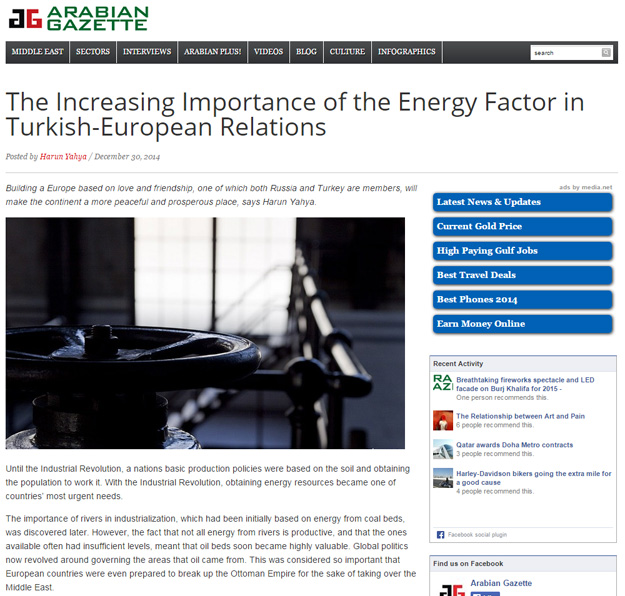
Until the Industrial Revolution, a nations basic production policies were based on the soil and obtaining the population to work it. With the Industrial Revolution, obtaining energy resources became one of countries’ most urgent needs.
The importance of rivers in industrialization, which had been initially based on energy from coal beds, was discovered later. However, the fact that not all energy from rivers is productive, and that the ones available often had insufficient levels, meant that oil beds soon became highly valuable. Global politics now revolved around governing the areas that oil came from. This was considered so important that European countries were even prepared to break up the Ottoman Empire for the sake of taking over the Middle East.
Stratagems based on energy did not come to an end with the fall of the Ottoman Empire; indeed, that was just the beginning. The Middle East was now the region that dominated the world political agenda. The great crises that have occurred in the latter half of the 20th Century, and continuing to the present time, have in some way connected to the Middle East. The best known of these was the 1973 oil crisis.
With the Ukraine crisis, countries involved in the transportation of oil and natural gas became just as important in the equation as the countries possessing those natural resources. Civil war in Ukraine, used as a transit hub for the transportation of Russian natural gas to Europe, and its becoming a focal point of tensions between Russia and Europe, raised the question of a search for new energy routes.
One of these was the South Stream Natural Gas Pipeline bypassing Ukraine. Under the project, gas from Russia would pass through the Black Sea to Bulgaria, from where it would be linked to the rest of Europe. However, the sanctions applied by the EU against Russia because of its role in the Ukrainian Civil war and problems stemming from the EU regarding that part of the pipeline to be built in Europe delayed the project.
Indeed, on his visit to Turkey, Russian President Putin announced that the pipeline should run to Europe through Turkey, rather than the Black Sea. The approval of the environmental impact report for the Akkuyu Nuclear Plant – to be built in Mersin in the south of Turkey – on the same day that Putin made that statement attracted great attention. That confirmation was one of the most important steps toward making the project a reality. Putin responded to that gesture with a 6% price reduction in the natural gas it sells to Turkey as of January 1st, 2015.
These reciprocal gestures led to a readjustment of the energy equation for Europe. Immediately after Putin’s visit, a high-ranking EU delegation came to Turkey. In the press, the primary reason for the visit was stated to be a quest for cooperation with Turkey, so that the energy cooperation Turkey will embark on with Russia would not cause any losses for the EU.
Despite highly balanced and diplomatic statements, Europe is making its unease known at the increasing cooperation between Turkey and Russia. The EU therefore wishes its own views to be considered in energy cooperation. On December 5th, European Commission President Jean-Claude Juncker criticized Russian President Putin, who announced that the South Stream Natural Gas Pipeline had come to an end, and said that the EU wants energy to flow to Bulgaria and all of Europe; he added that the EU will not accept any blackmail in this issue.
The policy that the EU will adopt against Turkey in the face of Turkey’s increasing closeness to Russia has long since begun being discussed in international political circles. Indeed, following Putin’s announcement that the South Stream will pass through Turkey, Johannes Hahn, Commissioner for Regional Policy and the official responsible for expansion negotiations and who was with the visiting delegation, said there was no need to create competition between the EU and Turkey and that the accession talks would continue; Hahn further said that te economic relations between Turkey and the EU is very strong. He also added that there is mobility and he is estimating that another negotiation chapter would soon be opened. This statement was a sign of a change in the EU’s policy toward Turkey.
There is much about the EU from which Turkey can benefit in terms of freedom and democracy and the development of human rights and their becoming more deeply-rooted in the country. The EU must overcome Turkey’s suspicions that European countries are applying a rather blatant double standard to it by adopting more honest and sincere policies toward it.
It is also impossible under the present conditions for Europe to obtain the energy resources it needs from countries such as Syria, Iraq and Iran. The most economic and reliable path for energy resources in Russia and Central Asia and even in the eastern Mediterranean is through Turkey.
The EU must therefore refrain from driving a wedge between Turkey and Russia. Turkey and Russia, with which it enjoys close relations, must both be included in the EU. It is damaging to all of Europe for the EU to be giving the impression of being founded on material interests alone. The way that countries that desire to be a ‘union of the strong’ apply oppressive policies against those countries that they do not consider as one of their own is the greatest problem facing Europe today. Building a Europe based on love and friendship, one of which both Russia and Turkey are members, will make the continent a more peaceful and prosperous place.
Adnan Oktar's piece on Arabian Gazette:



